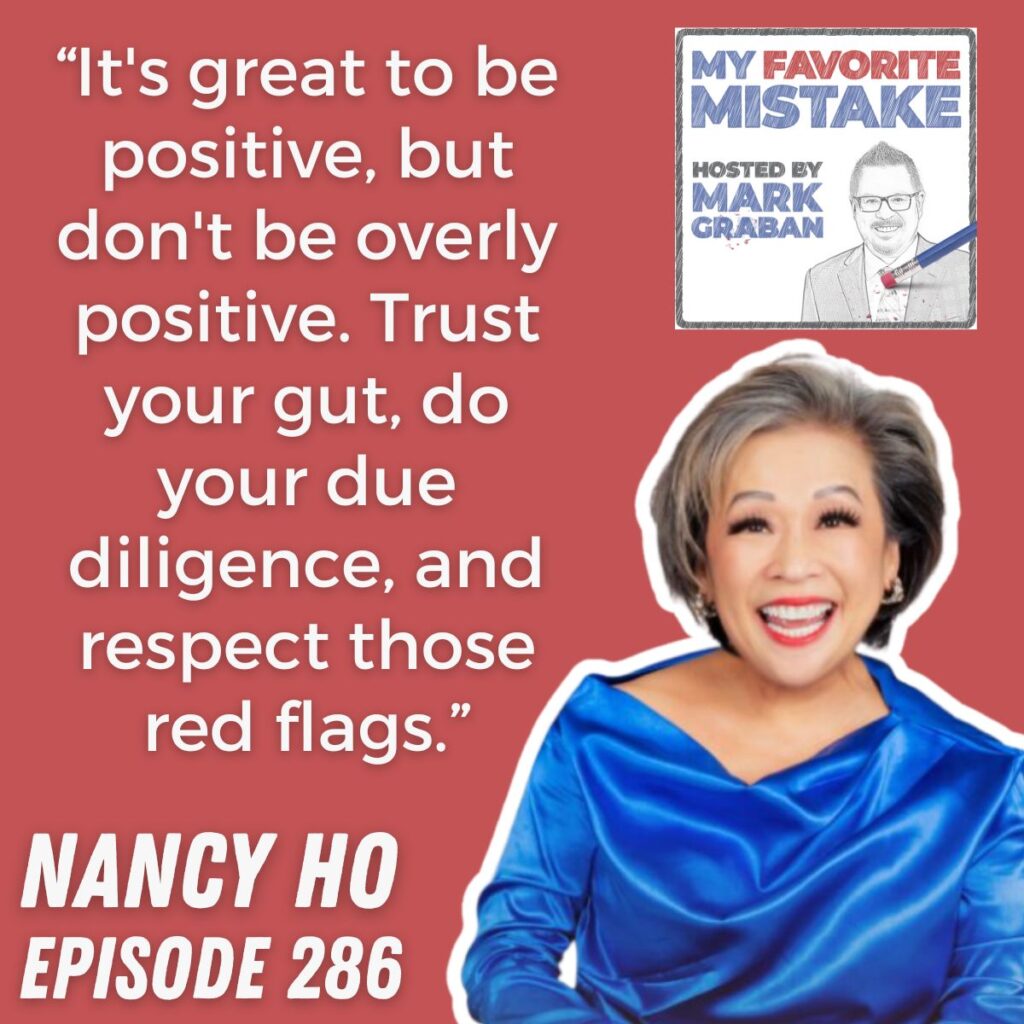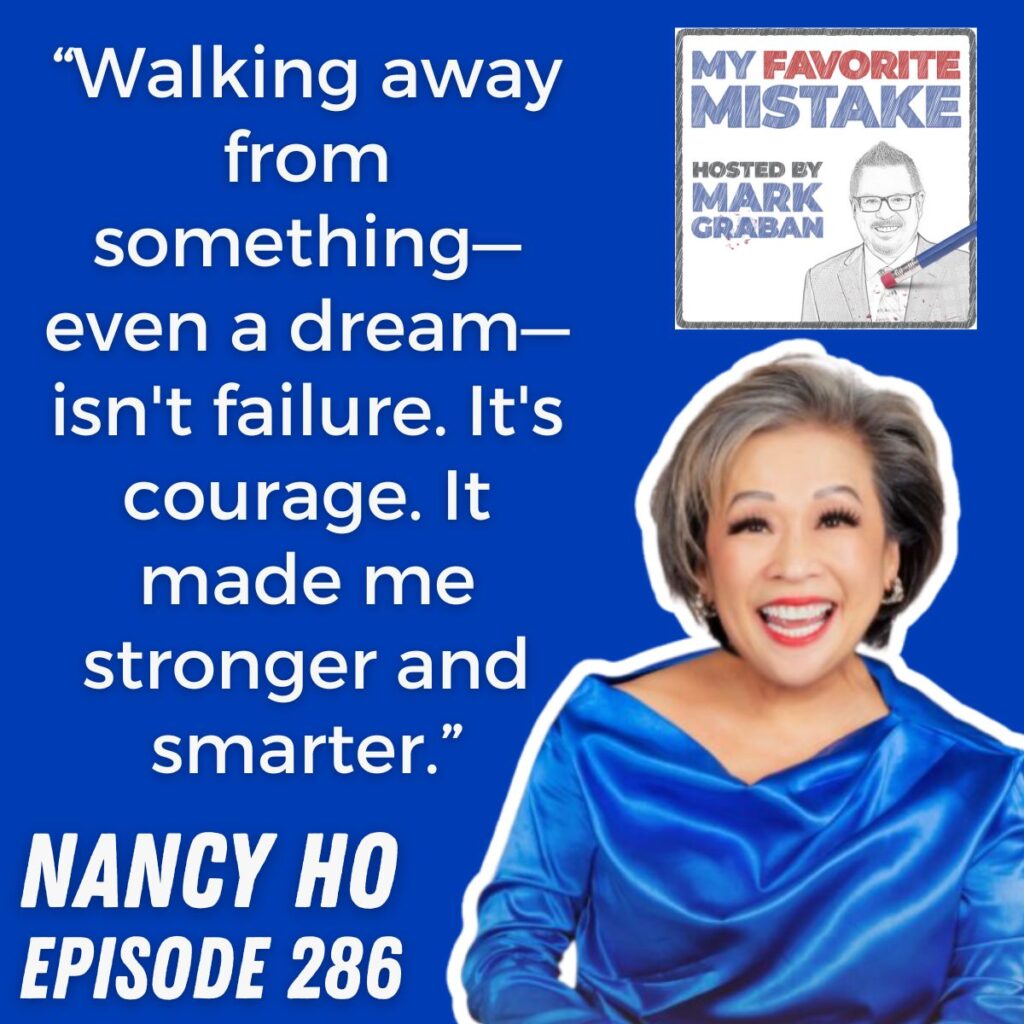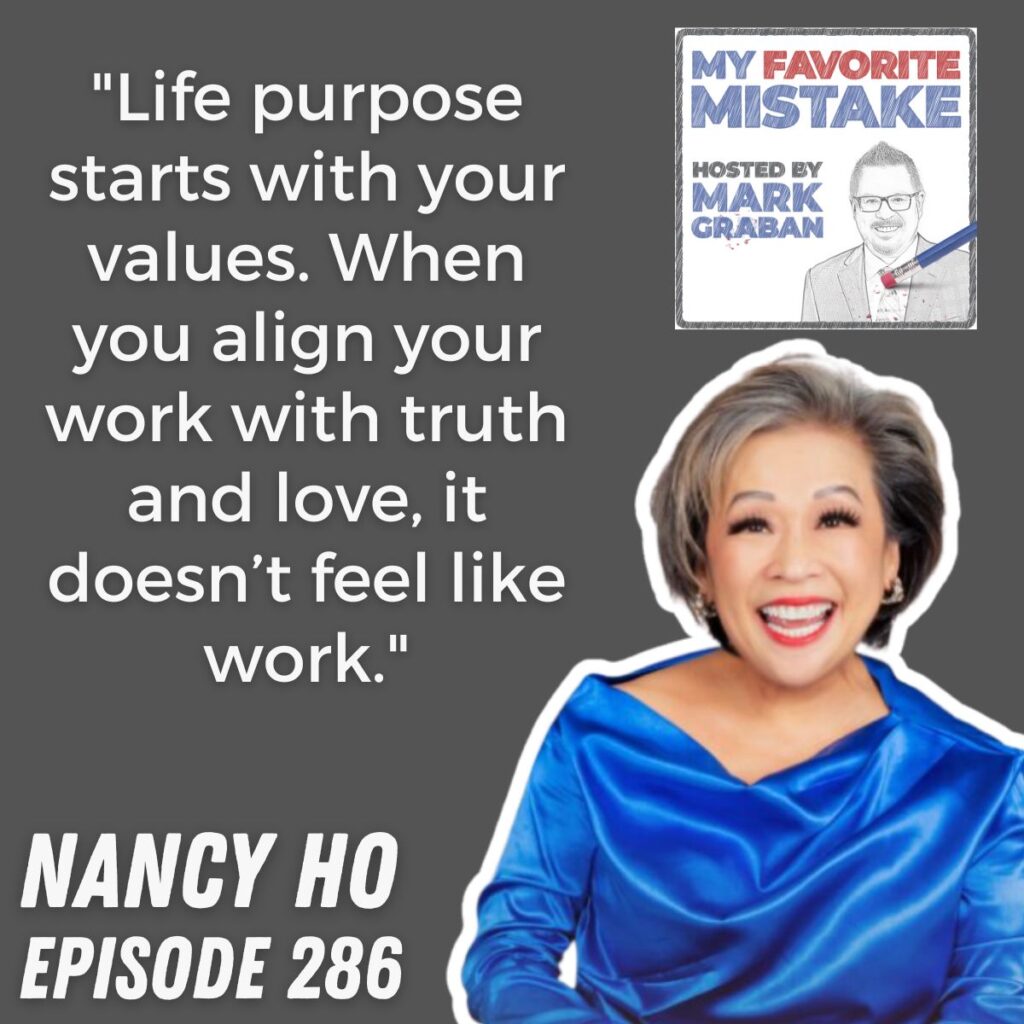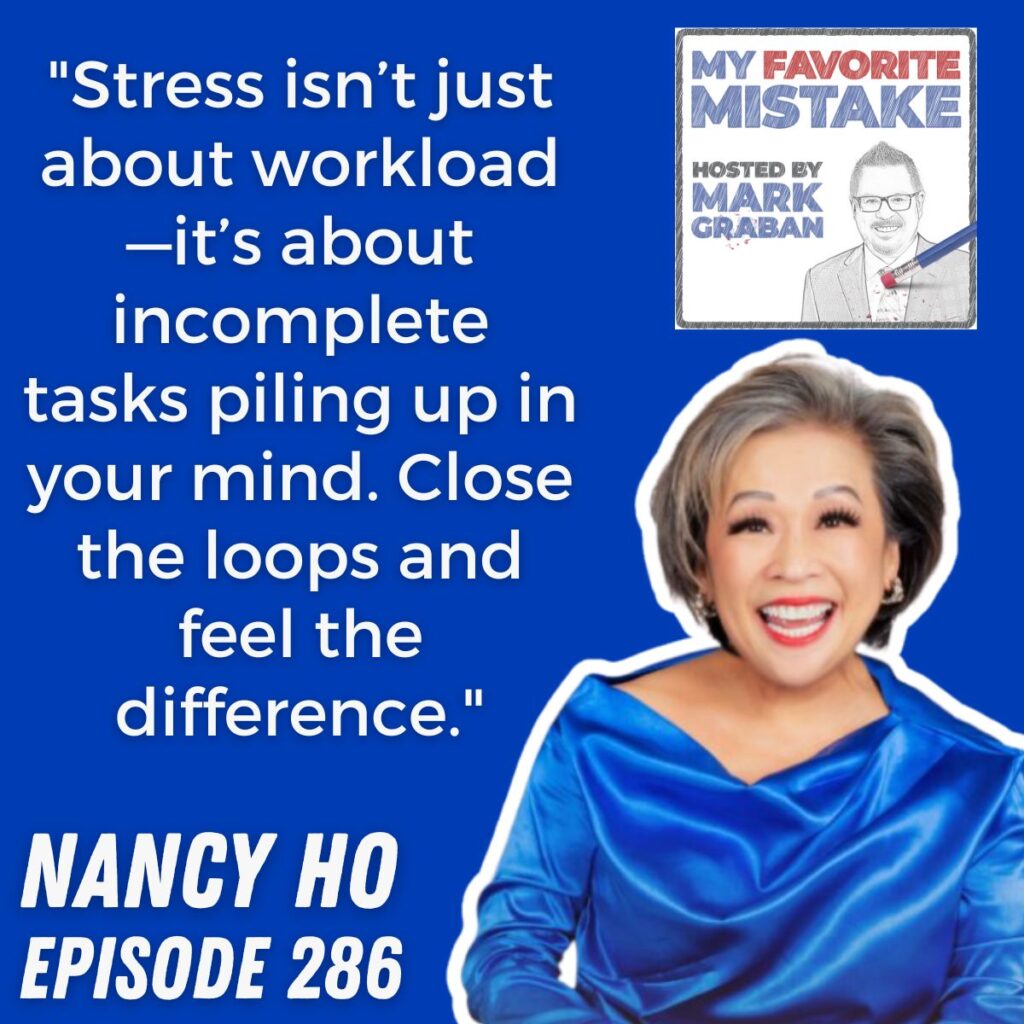Listen:
Check out all episodes on the My Favorite Mistake main page.
My guest for Episode #286 of the My Favorite Mistake podcast is Nancy Ho, a distinguished Life Strategist, Clarity Messenger, and State of Mind Specialist with over 26 years of experience guiding individuals toward holistic success.
Throughout her illustrious career, Nancy has empowered over 10,000 clients, including C-Suite executives, mid-level managers, and business owners, to navigate the intricate balance between professional achievement and personal fulfillment.
She’s co-author of the book Success Redefined with Jack Canfield.
In today's episode, Nancy shares the story of her favorite mistake—losing $300,000 in just five months pursuing a lifelong dream of opening a wine bar. She reflects on the critical lessons she learned about the importance of due diligence, trusting gut instincts, and recognizing misaligned partnerships.
Nancy discusses how this experience shaped her approach to coaching, helping clients uncover their life purpose, navigate the paradox of professional success, and integrate work and personal fulfillment. She offers practical strategies for managing stress, addressing incomplete tasks, and shifting from fear-based thinking to resilience and clarity. Nancy’s insights provide inspiration and actionable advice for anyone striving to align their career, values, and sense of purpose.
Questions and Topics:
- What is your favorite mistake?
- What were some of the biggest challenges you faced during this venture, and how did you handle them?
- What lessons did you learn from this experience, and how do you apply them in your work today?
- Do you have any regrets about walking away from the business?
- What is your life purpose, and how do you help others articulate theirs?
- What do you mean by the “professional paradox,” and how do you help clients facing career and life challenges?
- How do you approach unraveling the root causes of professional struggles for your clients?
- What strategies do you recommend for managing stress caused by incomplete tasks?
- How do you help clients shift from fear of failure to a mindset of resilience and growth?
- How has this mistake influenced your approach to life and business coaching?
Scroll down to find:
- Video version of the episode
- How to subscribe
- Quotes
- Full transcript
Find Nancy on social media:
Video of the Episode:
Quotes:
Click on an image for a larger view




Subscribe, Follow, Support, Rate, and Review!
Please follow, rate, and review via Apple Podcasts, Podchaser, or your favorite app — that helps others find this content, and you'll be sure to get future episodes as they are released weekly. You can also financially support the show through Spotify.
You can now sign up to get new episodes via email, to make sure you don't miss an episode.
This podcast is part of the Lean Communicators network.

Other Ways to Subscribe or Follow — Apps & Email
Automated Transcript (May Contain Mistakes)
Mark Graban:
Hi. Welcome to My Favorite Mistake. I'm your host, Mark Graban. Our guest today is Nancy Ho. She is joining us from Singapore. She's a distinguished life strategist, clarity messenger, and state-of-mind specialist, as she describes herself, with more than 26 years of experience guiding individuals toward holistic success. Throughout her illustrious career, Nancy has worked with and empowered over 10,000 clients, including C-suite executives, mid-level managers, and business owners, to help navigate the balance between professional achievement and personal fulfillment. So, we'll talk about those topics in the episode today. Nancy is co-author of the book Success Redefined with Jack Canfield. So, Nancy, welcome to the podcast. How are you?
Nancy Ho:
Thank you. My honor to be on this podcast. I'm very well.
Mark Graban:
Great. A lot of things that we're going to talk about later in the episode about work-life balance and struggles that successful professionals often need to work through. But first, I'm really curious to hear from your career, Nancy. What would you say is your favorite mistake?
Nancy Ho:
Oh, my favorite mistake. Kind of big time. You know, that mistake cost me $300,000 in just five months.
Mark Graban:
Wow. Well, I'm glad you can laugh about it now.
Nancy Ho:
So now you see what I mean by favorite, right? Really?
Mark Graban:
Oh, okay. You got our attention. Yes. What happened?
Nancy Ho:
Yes, what happened. In fact, it was an adventure that was kind of like a lifetime dream. Yes. So think about it—you know, it's a lifetime dream, and then it just fell flat. It’s not just about the money. It’s really the dream that I wanted so much. And then it just, you know, went into pieces, like, blew up in my face.
Mark Graban:
So what was that dream?
Nancy Ho:
Okay. I'm never into or interested in any F&B business, although I am hotel trained. Since I'm hotel trained, I know how hard it is. Unlike someone who might frequently go to restaurants or bars and think, “Oh, this is chill,” I knew from my training in Switzerland at age 19 how tough it could be. But what happened was this: I’m a wine-and-dine person, all right? Anywhere I go. And I’m a city person. Yet there wasn’t any place that I felt totally satisfied with—something always felt missing. So, I wanted to create a sanctuary, a place where you could dine alone or with someone, not a family restaurant, but with good food, good wine, and great ambiance.
So, when an opportunity came along just three minutes away from my office, it seemed ideal. It was an empty space I could make my own. I even installed a six- or eight-foot-long aquarium in the entrance. It was all about creating this sanctuary. But the biggest mistake was I was overly positive.
Mark Graban:
There were red flags you didn’t see or didn’t acknowledge?
Nancy Ho:
Yes, I had blinders on. There were a lot of red flags. On hindsight, I can see them clearly, but at the time, I thought, “I can work through this. Challenges are no big deal.” That was a big deal. Everything that could go wrong went wrong. And anything that might not go wrong also went wrong. It was five months of mental torture.
Mark Graban:
What were some of the biggest problems? And could any of them have been avoided?
Nancy Ho:
The first mistake—and this is from my lessons—scrutinize your partners. I joined two other partners, A and B. I was the C. A was there from the start, and B joined later. I was in charge; it was supposed to be my show. Everything seemed ideal: the downstairs had a pub that looked like a thriving business, and I had the upstairs to do whatever I wanted. It was so exciting. But I didn’t know that A and B were fighting. I didn’t know they had money issues.
Mark Graban:
So it looked like a thriving business, but that wasn’t the case?
Nancy Ho:
Exactly. On the surface, it seemed like the downstairs pub was thriving. And upstairs, I called it “The Wine Loft,” and things started well. Magazines came to write about me, the British Council Women’s Chapter wanted to partner, and people loved the space. But then the money issues with the downstairs business surfaced. And there were fine print clauses in the partnership agreement I didn’t catch that limited what I could do upstairs.
Mark Graban:
So you couldn’t execute your vision fully?
Nancy Ho:
I did for five months. But then I realized I would bleed for a long time if I didn’t walk away. That’s one lesson: knowing when to walk away.
Mark Graban:
No regrets about walking away?
Nancy Ho:
None at all. It cost me $300,000, but I made the choice to walk away. It wasn’t sustainable, and it didn’t align with my life purpose.
Mark Graban:
Speaking of life purpose, what is yours, and how do you help others define theirs?
Nancy Ho:
My life purpose is to serve with truth and love, helping others live their lives purposefully and meaningfully. I guide people to discover their values because life purpose must align with values. For me, it’s truthfulness and love. When your activities align with your values, work doesn’t feel like work—it’s just what you’re meant to do.
Mark Graban:
What do you mean by the “professional paradox”?
Nancy Ho:
The professional paradox is when people achieve success—climbing the corporate ladder or running a business—but feel unfulfilled. They experience stress, burnout, health issues, or relationship problems. I help clients reverse-engineer fulfillment by integrating their personal and professional lives, managing stress, and reconnecting with their purpose.
Mark Graban:
What strategies do you recommend for managing stress, especially from incomplete tasks?
Nancy Ho:
The subconscious doesn’t distinguish between big or small incomplete tasks—they’re all “open loops.” I recommend setting deadlines to close those loops. Even if you can’t finish something immediately, scheduling it brings relief. For long-term projects, break them into smaller, manageable tasks and check them off. Completing even small steps triggers a dopamine boost and reduces stress.
Mark Graban:
How do you help clients overcome fear of failure or mistakes?
Nancy Ho:
Fear of failure often comes from childhood experiences, stored in the subconscious. I help clients uncover and expose those root causes. Once they realize the fear isn’t real, it loses its grip. We then work on reframing thought patterns, building resilience, and creating strategies to move forward.
Mark Graban:
Thank you for sharing your favorite mistake and so much insight today, Nancy. Your book, Success Redefined, co-authored with Jack Canfield, is available on Amazon. I’ll include links in the show notes.
Nancy Ho:
Thank you, Mark. It’s been a pleasure to share my story and connect with your audience.
Episode Summary and More
Strategies for Balancing Professional Achievement and Personal Fulfillment
Navigating the balance between professional achievement and personal fulfillment can be a daunting task. Nancy Ho, a distinguished life strategist and co-author of “Success Redefined” with Jack Canfield, offers invaluable insights drawn from her 26 years of experience guiding numerous clients, including C-suite executives, mid-level managers, and business owners. Here’s how we can all learn to maintain this delicate balance.
Understanding Holistic Success
Holistic success is not just about career accomplishments; it’s about achieving a state of well-being across all areas of your life. Nancy Ho's extensive career provides a blueprint for attaining this balance. She underscores that professional success should not come at the expense of personal satisfaction.
Using her own life as an example, Nancy highlights the importance of not being overly positive to the point of ignoring red flags. Her venture into the food and beverage industry—a lifelong dream that ultimately became her “favorite mistake”—taught her the necessity of maintaining a realistic and balanced outlook. Rather than allowing her dream to blind her to obvious warning signs, Nancy advises scrutinizing partnerships and being willing to walk away when a situation becomes untenable. This ensures that your pursuit of professional goals does not compromise your personal well-being.
Learning from Mistakes
Mistakes are inevitable, but they can also be powerful learning experiences. Nancy's $300,000 loss in a failed business venture underscores the importance of risk assessment and the dangers of ignoring red flags. She emphasizes that one should not be deterred by setbacks but should instead view them as valuable lessons that contribute to future successes.
Nancy’s experience teaches us to look beyond just the immediate impact of a mistake and understand the long-term implications. For instance, she became aware of the ongoing conflicts and money issues among her business partners only after several months into the venture. This realization prompted her to make the difficult decision to cut her losses. Nancy’s ability to distance herself emotionally and make a pragmatic decision underscores a crucial strategy for balancing professional and personal fulfillment: recognizing when to persist and when to let go.
The Importance of Work-Life Balance
Achieving a work-life balance is critical, especially for high-achieving professionals. Nancy's journey illustrates the importance of creating a personal sanctuary, a space where one can unwind and recharge. Despite the eventual failure of her wine and dine establishment, she cherished the concept of creating a relaxing and aesthetically pleasing environment that resonated with her personal interests.
Notably, Nancy's vision for the “wine loft” was a testament to her commitment to personal satisfaction. Although the venture was financially unsuccessful, the emotional and psychological benefits she derived from pursuing her dream were invaluable. Nancy's experience teaches us that having a personal project or space that brings joy and relaxation is essential for maintaining overall well-being.
Scrutinizing Partnerships
One of the key lessons from Nancy’s experience is the importance of scrutinizing partnerships. Entering a business arrangement with the right partners can mean the difference between success and failure. Nancy admits that her partners had financial and personal conflicts that she was unaware of until it was too late. These issues significantly contributed to the venture’s failure.
When embarking on new professional endeavors, thorough due diligence is crucial. Understanding the financial health and personal dynamics of potential partners can prevent costly mistakes and ensure that the partnership aligns with your professional and personal goals.
Recognizing When to Walk Away
One of the hardest lessons anyone can learn is recognizing when to walk away from a failing venture. Nancy’s decision to close her business after five months was driven by her realization that continuing would only lead to greater financial loss and personal stress. This decision, though difficult, ultimately preserved her mental and emotional health.
Knowing when to cut your losses is vital in business. Persisting in a venture that shows little promise of improvement can drain resources and morale. Acknowledging the need to discontinue a project is a sign of strength and pragmatism, not failure.
Alignment with Life Purpose
Finally, ensuring that your professional activities align with your life purpose is fundamental for lasting fulfillment. Nancy's realization that running a food and beverage business did not align with her life purpose was pivotal. Despite her passion for creating a personal sanctuary, the demands and sacrifices required did not fit her long-term goals.
Identifying and dedicating yourself to a career that aligns with your values and life purpose provides both personal satisfaction and professional success. It prevents burnout and enhances the quality of both your work and personal life.
These insights from Nancy Ho demonstrate the complexities of balancing professional achievement with personal fulfillment. Through self-awareness, realistic optimism, partnership scrutiny, and alignment with one’s life purpose, it is possible to achieve a state of holistic success that enriches all aspects of life.
The Professional Paradox
The professional paradox is a term that vividly captures the plight of many high achievers. Externally, they seem to possess everything one could desire: career success, financial stability, and a network of influential connections. However, internally, these individuals often grapple with feelings of emptiness and dissatisfaction.
Defining the Professional Paradox
Nancy Ho emphasizes that true success isn't solely about climbing the corporate ladder or amassing wealth. It's about the holistic integration of professional and personal fulfillment. The paradox arises when people achieve conventional markers of success but still feel unfulfilled and disconnected from their true selves.
Achieving Balance in Professional Life
For many professionals, the journey towards achieving balance begins with introspection. Recognizing and understanding one's life purpose is crucial. As Nancy articulates, knowing the “why” behind your actions can transform your professional journey from just a task into a fulfilling venture. This inner clarity helps individuals choose roles and responsibilities that align with their values and life purpose.
Overcoming Stress and Burnout
Stress and burnout are common consequences of the professional paradox. High demands at work can lead to mental and physical health issues, eroding the joy and satisfaction from professional achievements. Nancy stresses the importance of creating strategies to manage stress, such as setting realistic goals, taking regular breaks, and seeking professional help if necessary.
Creating a personal sanctuary or a hobby that aligns with your interests can be an effective way to counterbalance work-related stress. This sanctuary doesn't have to be a grandiose project like Nancy's “wine loft”; it could be as simple as a dedicated time for reading, gardening, or any activity that brings relaxation and joy.
Evaluating Job Matches
Understanding whether a particular job or role is the right fit is another critical element Nancy discusses. Beyond the allure of lucrative packages and prestigious titles, it's essential to evaluate how well a job aligns with your values and life purpose. For instance, if a role promises high financial rewards but demands sacrifices that conflict with your personal values or disrupt your work-life balance, it may not be the ideal fit.
Trusting Your Instincts
Nancy highlights the importance of paying attention to gut feelings and instincts. Often, in the excitement of new opportunities, individuals might ignore warning signs. Learning to trust and respect your inner voice can be invaluable in making sound decisions. Whether it’s recognizing misalignments in a business partnership or sensing an unspoken discord within a new role, trusting your instincts can prevent long-term dissatisfaction and losses.
Mentoring and Coaching Others
Leveraging personal experiences, especially failures, in mentoring others is a powerful way to create positive impacts. Nancy uses her own business struggles to provide relatable and valuable guidance to her clients. She emphasizes that authenticity and transparency in sharing experiences can help others navigate their professional journeys more effectively.
These insights reinforce the idea that professional success and personal fulfillment are not mutually exclusive. By aligning your career with your life purpose, managing stress, evaluating job fits carefully, and trusting your instincts, it’s possible to navigate the professional paradox and create a fulfilling, balanced life.
Integrating Personal Development
Understanding the root issues behind professional struggles is pivotal. Often, the underlying concerns are not about the job itself but stem from unresolved personal experiences. These can manifest as various forms of stress and anxiety in the professional realm. For instance, childhood traumas might resurface, impacting relationships and health. Such issues underline the necessity for a holistic approach to addressing professional dissatisfaction.
Addressing Underlying Triggers
To effectively resolve professional struggles, it's essential to get to the root cause rather than merely addressing symptoms. Nancy Ho emphasizes the significance of introspective work to understand these triggers. This approach involves delving into past experiences that shape current behaviors. By recognizing and acknowledging these deep-seated issues, professionals can begin to address them, leading to a more fulfilling professional life.
Case Study: Fear of Failure
One common root cause is the fear of failure. Nancy illustrates this with an example of a brilliant medical doctor who confidently lectures to students but freezes up when speaking to senior professionals. The root of his anxiety was an unresolved need for approval from his father. Understanding this childhood trigger helps to reframe current stressors and paves the way for more effective coping mechanisms.
Techniques for Stress Management
Managing stress effectively involves not just coping with the workload but also addressing the psychological aspects of incomplete tasks. Nancy discusses how our brain's biology reacts to stress, producing cortisol, which can lead to various health issues. To counteract this, it's essential to create strategies that promote the production of positive chemicals like dopamine and serotonin.
- Breaking Down Tasks: Large, overwhelming projects can be broken into smaller, manageable tasks. For example, writing a book could be segmented into daily goals of writing a set number of words.
- Setting Deadlines: Assigning specific timelines for tasks helps to close the loop on incomplete tasks, reducing stress and enhancing productivity.
- Celebrate Small Wins: Each completed subtask should be recognized as a success, producing a dopamine burst that encourages further achievements.
The Role of Work-Life Integration
Nancy champions the concept of work-life integration over the traditional notion of work-life balance. The idea is not to separate work and personal life but to blend them harmoniously. This approach ensures that personal fulfillment is not sacrificed for professional success.
- Prioritizing Personal Interests: Allocating dedicated time for personal hobbies or relaxation activities, such as gardening or reading, can provide a much-needed respite from work-related pressures.
- Incorporating Family Time: Integrating family engagements with professional responsibilities helps maintain a balanced life, reducing overall stress.
Mentorship and Authentic Leadership
Authenticity in leadership involves sharing personal experiences and failures transparently. This not only builds trust but also guides others through their professional journeys. Nancy emphasizes that leaders should not just issue instructions but foster environments where individuals can realize their potential through self-discovery.
Real-World Applications
- Example: Incorporating mentoring sessions where leaders openly discuss their challenges and failures can create a supportive culture.
- Impact: This practice encourages an honest dialogue about professional struggles, helping to identify and resolve deep-seated issues collectively.
Mindfulness and Mental Health
Mindfulness practices are effective tools for minimizing stress and enhancing focus. Techniques such as meditation and mindful breathing practices can help professionals stay grounded, focused, and more productive.
- Mindful Breaks: Short, regular breaks throughout the workday to practice mindfulness can reduce stress and improve overall mental well-being.
- Journaling: Keeping a journal to jot down tasks, progress, and reflections can provide clarity, reduce mental clutter, and promote a sense of accomplishment.
By embracing these strategies, professionals can transform their work experience from one of stress and dissatisfaction to one of fulfillment and balance. Aligning career objectives with personal purpose, maintaining a balance between professional responsibilities and personal interests, and proactively managing stress are key to overcoming the professional paradox.
Understanding Physiological Responses
Nancy Ho elaborates on how unresolved past experiences create physiological responses that hinder professional flow. This manifests as an inability to seamlessly discuss topics one is knowledgeable about, due to underlying stressors unrecognized by the individual. The physiological reactions aren't always about knowledge gaps but rather, mental clutter from unresolved issues. Addressing these can significantly improve professional performance.
Personalized Coaching
Not everyone has the same experiences, traumas, or triggers, which is why personalized coaching is critical. Nancy stresses the importance of understanding that each individual's journey towards resolving these issues is unique. Personalized coaching strategies not only help identify these deep-seated issues but also guide the individual through a customized path of healing and professional development.
Importance of Awareness
Once an individual identifies the root cause of their professional anxiety, they can begin the process of healing. Nancy suggests that the mere act of acknowledging these causes can resolve up to 80% of the problem. This self-awareness allows individuals to recognize that current stressors often aren't real threats, but rather remnants of outdated mental patterns. Reframing these perceptions is a significant step towards overcoming professional challenges.
Healing through Resilience and Reframing
Beyond uncovering root causes, Nancy emphasizes building resilience and reframing thought patterns. These strategies are instrumental for the remaining challenges. Developing resilience involves:
- Cognitive Behavioral Techniques: to shift negative thinking patterns.
- Mindfulness Practices: to stay grounded in the present moment.
- Visualization Exercises: to reimagine stressful scenarios in a more positive light.
Reframing thought patterns involves changing how one perceives a problem. Instead of seeing a professional challenge as an insurmountable obstacle, viewing it as an opportunity for growth can significantly reduce stress and increase productivity.
Building a Supportive Framework
For many professionals, having a supportive framework can be transformative. Nancy advocates for creating environments where open discussions about personal and professional struggles are encouraged. Such frameworks might include:
- Regular Check-ins: with mentors or coaches to discuss progress and setbacks.
- Peer Support Groups: where sharing and learning from each other’s experiences is encouraged.
- Accessible Resources: such as self-help books, articles, and mental health professionals.
Success Redefined
Nancy shares her insights and approaches in the book Success Redefined. This book, co-authored with Jack Canfield and other professionals globally, delves into different stories and strategies for redefining success beyond traditional metrics. The digital age has enabled Nancy to extend her reach and offer guidance to clients across the world, demonstrating that the principles of personal development and professional success are universally applicable.

